Wouldn’t it be awesome to ride on the back of an ancient elephant? I know I always dreamed of doing it! Some of my friends already had photos of themselves from Thailand, propped up on the spine of an elephant, huge grins on their faces and arms flailing in the air; I wanted the very same!
What I didn’t realize, though, was that elephants are a massive industry in Southeast Asia. Asian elephants, who are much less aggressive than their African cousins, have, for centuries, been used as a means of transportation and assistance in heavy labor.
Table of Contents
Responsible Tourism and the Cruel Nature of Elephant Tourism
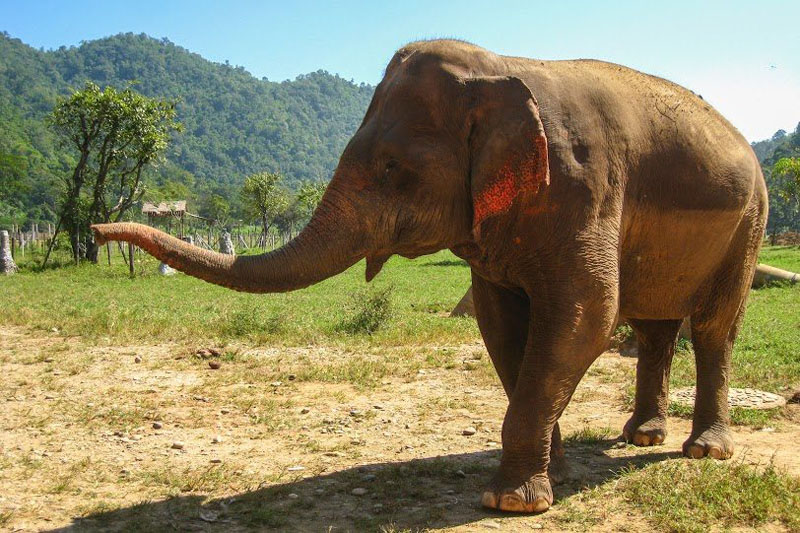
Elephants are wild animals; they belong in the pages of National Geographic next to lions and zebras, not on chains or with seats on their backs. Every day, Asian elephants are captured and abused, usually as babies, and broken of their wild spirit, in an effort to domesticate them.
Their mothers are often killed, and the babies are tied up, starved and beaten within inches of their lives (though some are accidentally beaten to death).
They learn to respond to humans through the understanding of fear, and are trained to do tricks and allow human beings to ride on their back. People pay good money for elephant rides and to watch them perform like circus clowns. Read: Ethical Travel Tips – How to Travel With a Better Impact
A Lucrative Industry
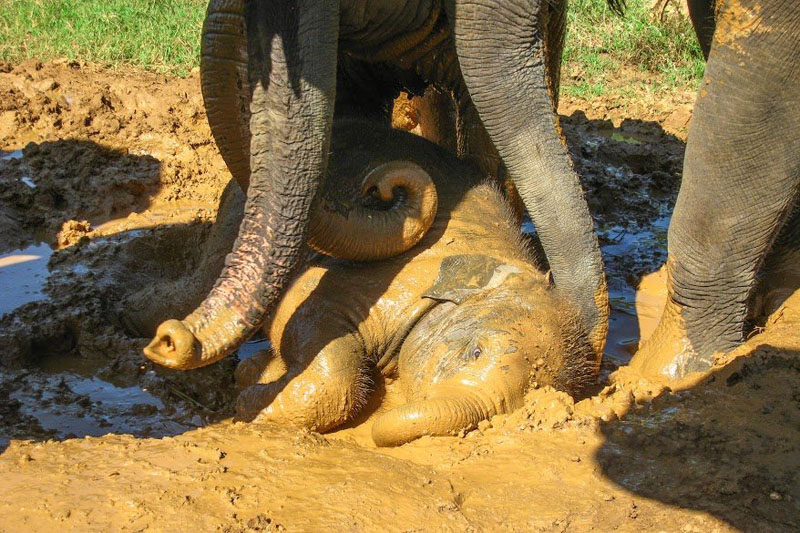
Elephant tourism is a lucrative industry in Thailand. This third-world country is in the midst of a massive economic flux due to tourism. Thailand was the most visited country in the world last year, and international money is being spent there, in large quantities. Read: 23 Fun Facts About Thailand – The Land of Smiles
The locals aren’t exactly wealthy, and some are quick to take advantage of the big money being spent in their country. They capture these elephants and force them to perform on streets and give rides to tourists.
Don’t Ride an Elephant
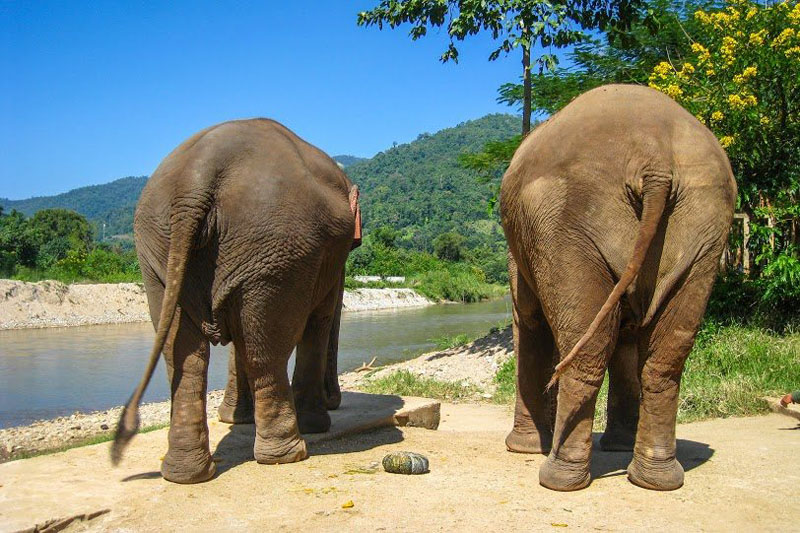
By riding an elephant, one directly contributes to this abuse. The dollars people spend to ride elephants count as an aimed vote in support of this practice. As a traveler, it is VERY important to gain insight into where we’re going and what we’re doing, and then vote with our dollar accordingly.
The idea of practicing responsible tourism is not a joke. Tourism has singlehandedly deteriorated the very nature (and, thus, appeal) of countries and cultures, and at this rate, Thailand might be next on the list. Read: How to Make Your Travel Meaningful
A Complete Lack of Care
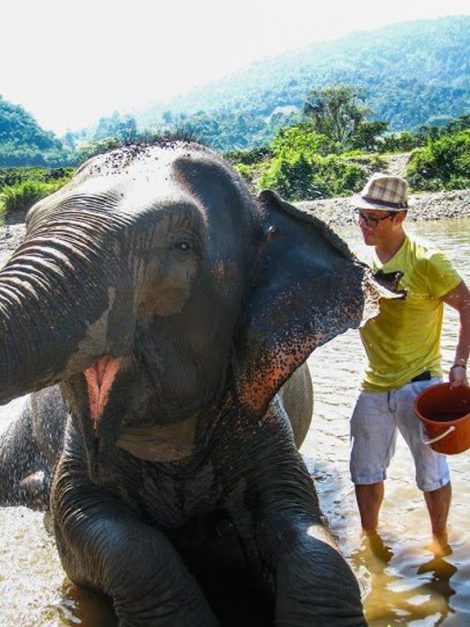
I was visiting an elephant riding camp in Northern Thailand. “I don’t want to ride one if I know it’s going to hurt it,” I overheard one girl mention. The rest of her friends agreed but admitted they didn’t actually know if it did. Being the nosy conversationalist that I am, I turned around and clarified her thought.
I explained, without being too preachy, that riding on the back of an elephant is actually detrimental to their spine and bone structure. For them, carrying a person is tantamount to someone sitting on your shoulders for the entire day. Read: World Oceans Day – 10 Ways to Save the Oceans
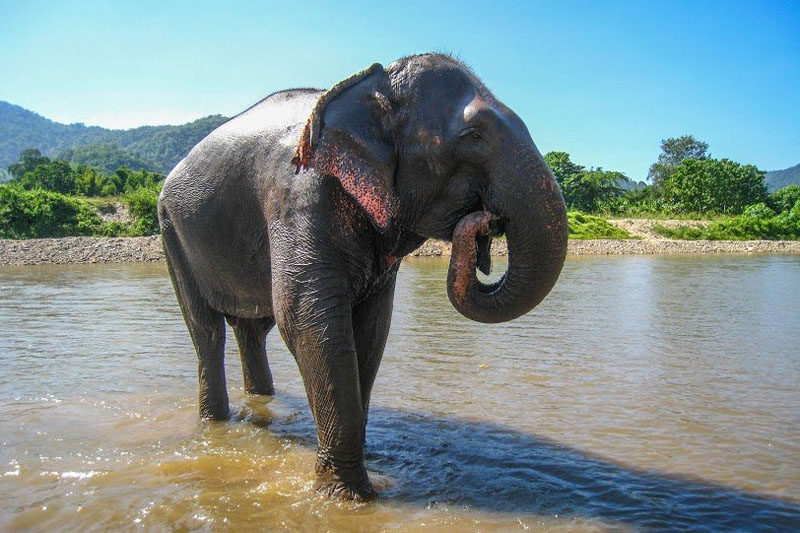
They were interested to learn this, actually, and I was happy to have introduced the idea to them. They asked more questions about how the elephants are treated and I explicated. In a nutshell, the answer was “not well.”
After a solid ten minute conversation about the state of animal tourism in Thailand and the barbarous nature of riding elephants, I bid the group of six farewell.
They had all said they wouldn’t be riding an elephant that day, or ever again. They would much prefer to visit a humane animal park like the one in Chiang Mai.
I applauded them, told them it was a great idea, and I took off to say hello to a four day-old baby elephant (cutest thing ever, by the way). Before exiting the park, I turned around once more, just in time to see all six of them sitting on the back of elephants. Read more: Best Travel Charities
How We’re Trying to Fix the Problem
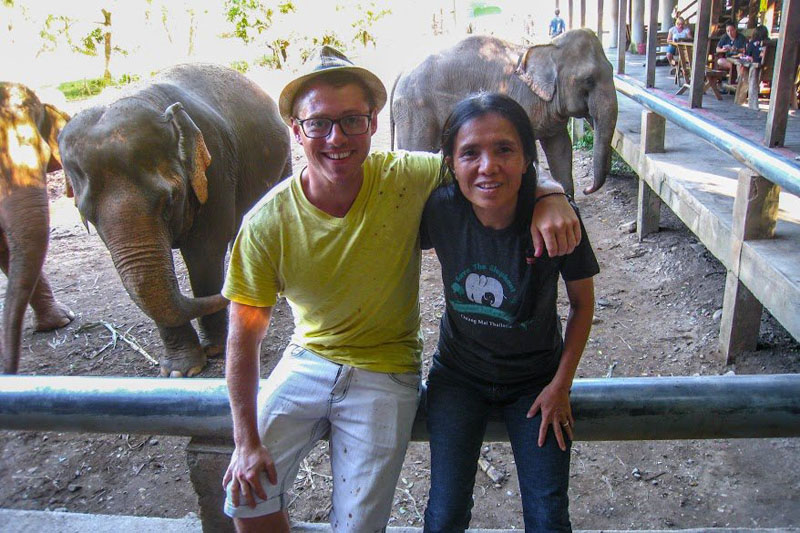
There is one saving grace for the elephants in Thailand. Lek Chailert has been rescuing elephants since 1992, and has become a member of numerous elephant tribes.
She is considered by the elephants at her park to be one of their own. She rescues elephants who have been captured, abused and broken and offers them a higher quality of life by giving them a safe home and showing them love and support rather than fear and pain.
She is their mother, and they love her.
Lek runs the Save Elephant Foundation, an organization which does just that.
This foundation operates the Elephant Nature Park in Chiang Mai, Thailand, a safe haven for rescued elephants. The park has reached capacity, however, and they don’t have any more room.
- Staying in Bangkok? Check out our guide on Where to Stay in Bangkok: A Guide to the Best Neighbourhoods
A collective group of more than 20 travel bloggers have come together to raise awareness about responsible tourism, animal tourism in Thailand, and to collect donations in support of this charity.
The project is called the Travel Blogging Calendar, and we are hoping that anyone who can identify with the frustration of irresponsible tourism, the plight of the elephants, or even understands the need for support will be kindhearted enough to donate to the Save Elephant Foundation.
Lek needs help to rescue more elephants, and we hope you will support the bloggers in their continued efforts to better the world. 100% of all proceeds go directly towards buying new land and building new shelters for the elephants.
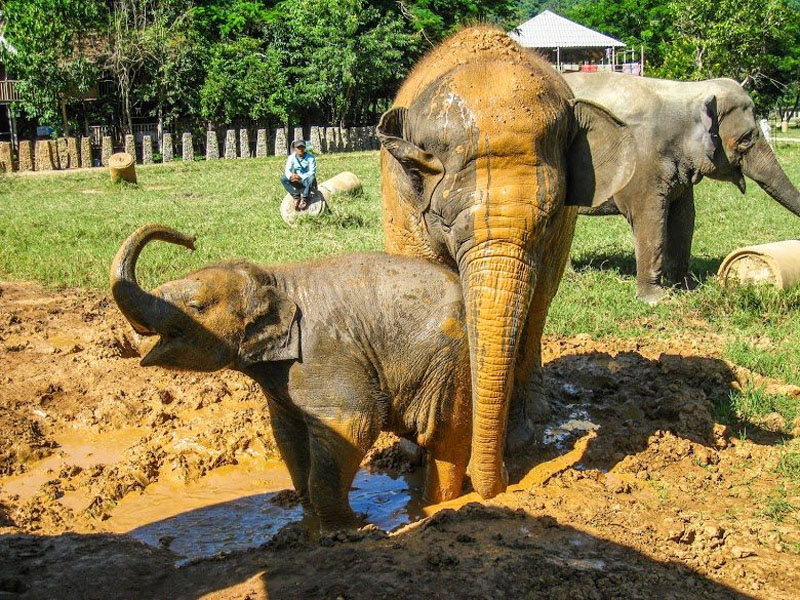
Jeremy Foster is the founder of TravelFreak.net a platform for personal growth and global understanding. Jeremy showcases stories of transformation and adventure, inspiring you to get out of the house, go somewhere, and try something you probably never thought you would. When Jeremy approached us to take part in this blogging initiative we were very excited. This is what travel blogging is all about.
By working together as a community we can all make great change and use our influence to let people know about social issues that we all care about. Thank you Jeremy for bringing 20 travel bloggers together for a worthy cause. Now let’s get out there and make a difference!


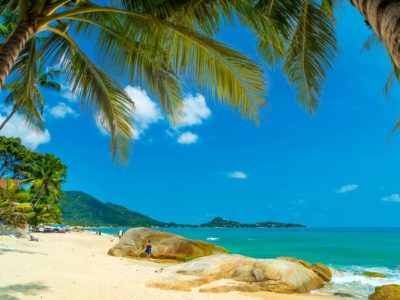
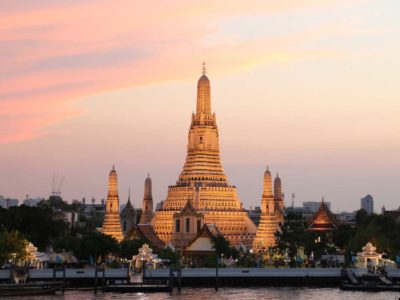
wow, beautiful research…
this would be the only country where we can see the way the give the affection towards the public…
and cant stand without mentioning this Thailand is the de best conservative culture maintaining place…
Such an important read. We’re in Chiang Mai and we have been doing lots of research- found your article very helpful.
Hey Dave and Deb! Thank you so much for participating in this year’s efforts to raise funds and awareness to this cause!! I too was one of those who wanted to (and did) ride an elephant when I first arrived to Thailand. It was a big eye-opener to learn what was actually happening behind the scenes, and broke my heart! That’s one of the main reasons I decided to participate in this year’s efforts, both through fundraising, and through the donation of the trip around Thailand! My only hope is that this is one of the first of many efforts to try and topple the abusive industry which exists here and elsewhere. The world is waking up – I’m so happy to be able to be part of the global consciousness and community alongside yourselves! 🙂
Well said Ian. The world is waking up. With online and social media, messages like this have a much better chance of reaching the mainstream public. Education is the key
Thanks for continuing to bring attention to this important issue. During our time in SEA (especially Thailand and Laos) we spent hours and hours trying to research and find an operation/program that was responsible and had the best interests of elephants as their first priority. Of course there are countless reviews of how much fun people had, and how beautiful and smart the elephants are, but it was so difficult to sort through glowing reviews and endless self-promotion by tour companies to find the truth. Even among companies who seem to be making an effort, things may be quite different when you actually get to the facility. We didn’t end up visiting any program in Thailand at all for this reason. We really wanted to spend our money wisely and responsibly. We ended up visiting a project in Laos that we felt mostly good about, though there were a couple of things we didn’t agree with. Very happy to know about the project in Thailand, and hope we can help spread the word. In any case, we will continue trying to educate ourselves in order to travel responsibly. Thanks for helping us to achieve this.
Good for your for searching for responsible companies to travel with. It can be difficult to sift through all the noise, but it is worth the effort. I’m glad that you found a place in Laos.
Yay Lek! I was just there in November, but now I am embarrassed to post lol. Your pictures are amazing! You caught such vibrant expressions… Those elephants are something else, right? Great post on a fantastic lady and park.
Elephant trekking remains popular, despite the best efforts of bloggers and the press to draw attention to the plight of Thailand’s elephants.
Convincing the owners of the trekking centers that what they are doing is not in the best interest of the elephant is going to be mighty hard.
For the owners to come up with viable solutions may be even harder if they are to continue making enough profit for the upkeep of their elephants. let’s just hope whatever happens does not result in thousands of elephants in limbo.
Thailand is a land of elephants. I enjoy this blog very much thanks sharing With Us.
This is a real issue. Elephants are animals worked as most people work horses or donkeys. The difference is that elephants get closer to our hearts than horses and donkeys. People in these places are making a living and happen to have elephants as working animals. As long as they are treated and fed well, I don’t see anything wrong with that.
Great point Alfredo. We’ve actually thought about this before and it’s a situation where elephants are losing their habitat and they need a purpose. Unfortunately humans are encroaching on their environment, so if we don’t find balance, they won’t survive. The issue is how they are broken and how their mother’s are murdered so that people can snatch the babies and put them to work. Like you, I believe that if they are treated well, there is a place for elephants working, we just need to create awareness and stop people from abusing them. Sadly most othe elephants that end up here are formerly abused and mistreated.
Great article! I’ve been that naive tourist just a few months ago in Thailand until one of my friends joined me a week later and opened my eyes up to this saddening trade…Nice post one…
Someone needs to go Ong-Bak on those elephant handlers who treat them with abuse instead of love.
It’s great what Lek is doing though & I hope she gets the donations she needs & deserves!
Ha, I love the Ong-Bak reference. Yes indeed, I’d watch that movie. I hope they reach their goal too and the next time we’re in Thailand, we are definitely going to visit.
Great story. I did a one day elephant conservation camp experience in Chiang Mai and absolutely loved it. (Elephants have been my favorite since early childhood.) Seeing them mistreated at shows and elephant riding areas is heartbreaking. Good work.
It is heartbreaking. I didn’t know a lot about their treatment before this campaign. I had always heard that the Mahout had a strong bond with their elephant, I had no idea that the elephants were tortured and their mothers murdered. So sad. Hopefully we can all spread the word.
Great article! I’ve been that naive tourist just a few months ago in Thailand until one of my friends joined me a week later and opened my eyes up to this saddening trade. Great to see initiatives fighting to end this sadness, I’m now intending to volunteer at one on my next Thailand trip. 🙂
I think we all are surprised by the treatment. Thailand claims that they revere elephants and I always thought that they were well cared for. (save for some very bad apples that are always out there) I was totally wrong, I thought that the elephant camps were a lot like trail rides (sort of like horses) Elephants are running out of space in Asia and it’s a difficult situation, but nothing should be tortured and broken just so tourists can ride on them. It is so sad that their mothers are shot too. My heart breaks.
I hope many people will continue to fight for the welfare of the elephant not just in Thailand but in other countries as well.
Well said Kristy. The elephants are suffering everywhere. I think my saddest moments were watching the temple elephants in India. They are supposed to be sacred, but they live the most miserable lives. It’s a mindset that has to change. With more initiatives like this, it just may catch on.
Feels so sad to read this torture meted out to these gentle creatures. Such a noble cause Lek has undertaken, my best wishes to him 🙂
It is very sad indeed. I didn’t know a lot about this myself and I hope that we can figure out a way to live in harmony with elephants in the future. It’s difficult though as elephants in Asia lose their habitat. What can be done? With organizatione like the Save Elephant Foundation I think we can make a difference.
Thank you for such an informative article. My girlfriend Rose and I started our trip around the world and will be in Thailand beginning March 1st. I have always seen pictures and advertising about riding Elephants in Thailand and it was of course on our to do list until we read your article. We just spent a week at the Kruger National Park in South Africa, and after seeing the Elephants in their natural habitat, I was wondering to myself how it is even possible for them to let us on their back all day long… now I understand, and it’s very saddening to see how they modify the animal’s behavior and install fear in them… all to make a dollar off of many uneducated tourists (as I was myself before reading this). We will go to Chiang Mai instead. Thank you!
Wonderful comment Kamy. I think that more articles like this will help us all. I hope that you make it to visit Lek in Thailand. Seeing elephants in a sanctuary will be far more rewarding. We always thought that it was the only option for elephants to survive. As they lose their habitat (especially in Asia) where can they go and what can we do with them. Humans will never stop their urban sprawl and elephants are losing space, so in my opinion, maybe the only way was to put them to work as we do with horses on trail ride. I had no idea though that their mothers were murdered and then they were tortured to break their spirit. It’s horrible. And from a country that claims to revere elephants. Where did their soul go?
I’ve heard a lot about elephant treatment in Thailand, and it made me want to steer well clear of the industry.
It’s pretty shady. I’m happy to see that you’ve heard about this issue before! If you ever visit Thailand (or anywhere, really), there are lots of alternative ways to have a great day with the elephants!
Thanks Jeremy for informing all of us on the plight of the elephant. You definitely shed some light on what is happening out there.
Great to know that you’ve heard about it already. You are one of the informed ones.
This is such an impressive post! Although I had read about Elephant abuse earlier, I was intrigued to read about it again. I am happy that I have never sat on an elephant in my life! And now I wouldn’t want to!
Glad to hear that, Renuka! Thanks for your support!
Great to hear that you are already aware of the issues Renuka, good for you!
Great article, thank you so much. I had no idea after a lifetime of seeing photos of people riding on elephants that this practice was detrimental to their health. Supporting activities that help local economies is important to me when I travel, but I try not to support activities that are detrimental to environmental degradation or harmful to wildlife.
That’s exactly it, Jenni! Many people don’t know. Our aim is to both raise funds and awareness. I’m glad you had the chance to read the article and learn about it!
I agree with you Jenni, I had no idea that it wasn’t good for their back. I always assumed that they had strong backs like a horse and if two people can ride on a horse, what could it possibly do to an elephant. What a wonderful travel ethic you have, it’s important to support the local economies but even more important to make sure to do it in a responsible manner and it sounds like you already do that.